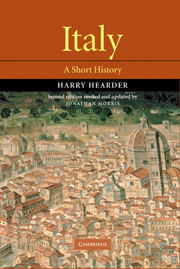Book contents
- Frontmatter
- Contents
- List of illustrations
- Preface
- 1 Italy in the classical world
- 2 The early Middle Ages
- 3 The high Middle Ages
- 4 The Renaissance
- 5 The political and cultural eclipse of Italy
- 6 The Risorgimento, 1790–1861
- 7 From Unification to Fascism, 1861–1922
- 8 The Fascist disaster, 1922–45
- 9 Italy since the Second World War, 1945–80
- Epilogue: From the First to the Second Republic: Italy 1980–2001
- A brief guide to further reading
- Index
5 - The political and cultural eclipse of Italy
Published online by Cambridge University Press: 05 February 2015
- Frontmatter
- Contents
- List of illustrations
- Preface
- 1 Italy in the classical world
- 2 The early Middle Ages
- 3 The high Middle Ages
- 4 The Renaissance
- 5 The political and cultural eclipse of Italy
- 6 The Risorgimento, 1790–1861
- 7 From Unification to Fascism, 1861–1922
- 8 The Fascist disaster, 1922–45
- 9 Italy since the Second World War, 1945–80
- Epilogue: From the First to the Second Republic: Italy 1980–2001
- A brief guide to further reading
- Index
Summary
The foreign invasions and wars of the sixteenth century
An Italian writer who anticipated the Europe of self-sufficient embryonic nation states – the ‘New Monarchies’ of France, Spain and England – was Niccolo Machiavelli (1469–1527). His knowledge came from two sources: the ancient Roman world, and his own contemporary Italian world, where secular principalities and republics acquired a sense of identity as independent units recognizing no higher authority, whether it be of pope or emperor. Fifteenth-century Italy was a microcosm of sixteenth-century Europe, where powerful monarchs nationalized their churches, and acquired a form of independence which was total in practice, and which would have been difficult for the medieval mind to conceive.
Machiavelli's most influential work was the short handbook for rulers which he called The Prince. He had held public office under the republic, and when the Medici dismissed him in 1513 he wrote his cynical, yet perceptive, commentary on the necessary skills for securing and retaining power. His argument took the secular spirit of the Renaissance to its most extreme point. In his eyes raison d'état necessitated the ignoring of all moral values; in his eighteenth chapter, he wrote:
A prince, and especially, a new prince, cannot observe all those things for which men are held to be good, it being often necessary, to maintain the State, to operate against integrity, against charity, against humanity, against religion.
- Type
- Chapter
- Information
- ItalyA Short History, pp. 126 - 152Publisher: Cambridge University PressPrint publication year: 2001



